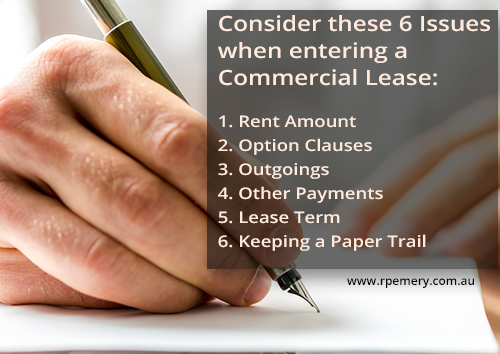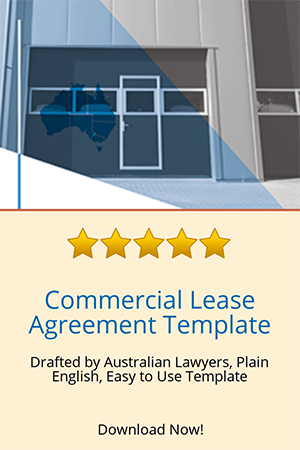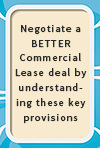Are you signing up or thinking of signing a commercial lease? Here are a few key provisions to look out for.

Rent – How much is it going to cost
It is vital to understand the potential monetary obligations under the commercial lease agreement – the most significant being rent. Make sure you have a solid understanding of the rent payable, which is usually a set base rent amount or a calculation which may be linked, for example, to turnover of the business.
In addition be on the lookout for provisions which may automatically increase your rent, for example rent reviews or rent adjustments. Make a note of the frequency of any rent reviews, and what the future rent will be throughout the term (and during Option periods) so you don’t get caught by any nasty surprises later.
Taking this simple step also allows you to consider whether there is scope in your budget and your future business projections to adequately sustain any increases in the rent.
The most common methods of rent review are:-
- To the market rent;
- In accordance with CPI;
- By a set percentage;
- A set amount; or
- By a combination of two or more of these methods.
Consider the Option Clauses
Examine the Option clauses closely – don’t assume rent will be treated the same.
Watch out for Ratchet Clauses
A ratchet clause is a clause which attempts to prevent any decreases in the rent.
For example, if the rent is to be adjusted in accordance with CPI or to market rent, and the CPI or the market rent has declined for that period, a ratchet clause would attempt to prevent the rent from decreasing in that instance.
In most states, ratchet clauses are automatically void.
Ensure that your lease review provisions are clear and that there is no attempt to prevent a legitimate decrease in the rent.
Outgoings (operating expenses)
Sometimes a tenant is required to contribute towards the outgoings (or operating expenses) of the leased premises. These operating expenses can include things like rates, taxes, cleaning costs for the building, insurances and the like.
Any obligation the tenant has to contribute to outgoings should be clearly set out in the lease document.
Make sure you are aware of, and agree to, any outgoings obligations contained in your lease. Seek estimates of the cost of the outgoings or further clarification from the landlord where necessary.
If the lease is a retail lease, then the landlord is under a legal obligation to supply estimates and reports to a tenant before the lease is entered into and at certain times throughout the term of the lease.
Landlords of commercial property (factories, warehouses, industrial premises) don’t usually have these legal obligations. In this case, the tenant should ensure that it is fully aware of the resultant cost of outgoings before committing to the lease.
Other monetary obligations
The Lease may place other financial or related obligations on the tenant.
These can include provisions which require the tenant to:-
- contribute to the costs of the landlord’s finishes, fixtures, fittings, equipment or services;
- refinish (repaint, recarpet, etc) the premises at certain intervals throughout the term of the lease or on the expiry of the lease;
- contribute to the landlords legal expenses, stamp duty or registration fees with regard to the initial Lease preparation costs or any future transfers or subletting arrangements.
Lease term and options
The term of the lease is the amount of time you can rent the shop for under the Lease. For example, the term of the lease may be 5 years.
At the end of the initial term of the Lease, there may be an option for the tenant to continue on under the Lease for a further term or terms. This could be, say, an additional term of 5 years, or there may be three options each for an additional term of five years.
There are benefits to both long and short term leases, and what suits you will depend entirely on your circumstances.
Short term leases may suit seasonal businesses or businesses who do not want to commit to a long term lease where their long term viability or profit is uncertain.
A longer lease gives the tenant certainty and prevents the costs associated with premature relocation.
Longer term leases may give a tenant greater bargaining power, with the ability to lower rent, gain concessions or obtain a rent free period, often used by landlords to induce tenants to enter into a lease. This is especially so in markets favourable to the tenant. If you elect to have a long term lease, you may need to ascertain whether there is room in the building to accommodate your expansion should your business experience growth during the long lease term.
Generally you will want to make sure the lease term is sufficient for you to recover your investment, make a profit and potentially, sell the business.
Put it in writing
You should keep thorough records of your negotiations with the landlord.
If you are entering into the lease based on certain promises or warranties made by the landlord, ensure that this is well documented within the terms of the Lease itself and becomes a part of your formal lease Agreement.
Verbal agreements or understandings can become the subject of disputes. Often it is difficult for a court or tribunal to ascertain whether such agreements even exist, let alone their terms.
Reducing all promises and warranties to writing, preferably within the Lease document itself, limits these types of disputes and provides protection for both the landlord and the tenant.
Other Commercial Leasing Resources
Ten ways to negotiate a BETTER commercial lease
 When negotiating a Commercial Lease it gives you greater power to understand the key provisions that will affect your bottom line. It’s not just the rent, there are a number of different clauses in the lease that contribute to the overall costs. Be aware that there are provisions that provide a little wiggle room and these often provide an opening to reducing the costs when negotiating with the Landlord.
When negotiating a Commercial Lease it gives you greater power to understand the key provisions that will affect your bottom line. It’s not just the rent, there are a number of different clauses in the lease that contribute to the overall costs. Be aware that there are provisions that provide a little wiggle room and these often provide an opening to reducing the costs when negotiating with the Landlord.
Is a verbal agreement legally binding?
 Verbal agreements can be legally binding and in fact many business and personal transactions are conducted purely on a handshake. But if things go wrong, it can be very difficult to sort the matter out or to even prove the agreement existed.
Verbal agreements can be legally binding and in fact many business and personal transactions are conducted purely on a handshake. But if things go wrong, it can be very difficult to sort the matter out or to even prove the agreement existed.
Is your Commercial Lease Secure?
 If you are a commercial or retail tenant, you may think that having a signed lease in place with the property owner is all that is necessary to give you security of tenure. However, there are other steps that you need to take to ensure that your leasehold interest in the land is secure.
If you are a commercial or retail tenant, you may think that having a signed lease in place with the property owner is all that is necessary to give you security of tenure. However, there are other steps that you need to take to ensure that your leasehold interest in the land is secure.
Go to Our Main Commercial Lease Contracts and Articles Hub Page

